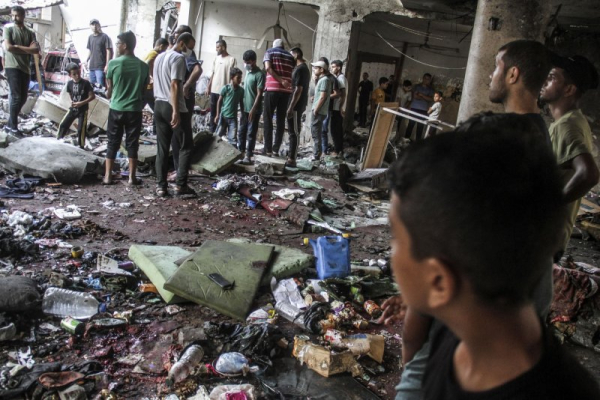
Palestinians search for victims following an Israeli strike that killed more than 100 people in a school sheltering displaced Palestinians. a medical source said, in Gaza City, on Saturday. U.S.-mediated cease-fire talks between Hamas and Israel are expected to resume Thursday. Photo by Mahmoud Zaki/UPI | License Photo
Gaza cease-fire and hostage negotiations are set to resume Thursday in Doha despite Hamas stating it will not show and amid fears of a potential Iranian strike on Israel.
The United States, a mediator in the talks, has been pushing for Israel and Hamas to sign a cease-fire agreement since the deal was announced by U.S. President Joe Biden in late May. But urgency to get it done has ramped up in recent weeks as Iran has vowed to conducted a retaliatory strike on Israel over the assassinations of Tehran proxy militia leaders in Lebanon and Iran. Advertisement
The office of Prime Minister Benjamin Netanyahu of Israel said Wednesday that he has approved the departure of the Israeli delegation to Doha, but Hamas has repeatedly said it is refusing to attend over the assassinations and ongoing Israeli attacks in Gaza while accusing Israel of not being serious about a permanent end to the fighting. Advertisement
“In light of this, and out of concern and responsibility towards our people and their interests, the Movement calls on the mediators to submit a plan to implement what they presented to the Movement and approved on July 2, 2024, based on Biden’s vision and the [U.N.] Security Council resolution,” Hamas said in a statement Sunday that was carried by the Hamas-affiliated Palestinian Information Center.
Despite Hamas’ public rejections, the Biden administration continues to state the negotiations will go ahead as planned.
“We fully expect these talks to move forward, as they should,” State Department Principal Deputy Spokesperson Vedant Patel told reporters Wednesday during a press conference.
He said Qatar, another mediator in the talks, has assured the Biden administration that there will be Hamas representation in Doha on Thursday.
The mediating countries of the United States, Qatar and Egypt scheduled Thursday for the resumption of talks last week, stating “there is no further time to waste nor excuses for any party for further delay” to get a deal done.
Israel and Iran have been in a proxy war for years that violently erupted into a war in Gaza on Oct. 7 when Tehran proxy militia Hamas launched a bloody assault on Israel, killing 1,200 Israelis, while another 250 were kidnapped and taken back into Gaza. Advertisement
Israel has responded by razing much of the Palestinian enclave in its determination to eliminate Hamas and find the Israelis held captive. Meanwhile, Iranian proxy militias Hezbollah of Lebanon and and the Houthi rebels of Yemen, embolden by the conflict, have also been attacking Israel.
Late last month, Fuad Shukr, the commander of Hezbollah, was assassinated in Lebanon. The next day, Hamas leader Ismail Haniyeh was killed in Iran.
Though Israel has claimed responsibility for Shukr, it has not commented on the death of Haniyeh. Iran holds Israel responsible for both assassinations and has vowed to retaliate.
Fears surround the potential of an Iranian strike as one will not only potentially thwart the possibility of securing a cease-fire but also escalate and expand the more than 300-day war through the Middle East.
Last week’s call for the resumption of cease-fire talks comes against the backdrop of these rising tensions and the Biden administration for days were confidently stating that the cease-fire deal was near done and that they were working to hold off Iran’s retaliation strike.
On Tuesday, Biden told reporters that he believes a cease-fire agreement will halt an Iran strike on Israel. Advertisement
“That’s my expectation, but we’ll see,” he said.
According to the Hamas-run Palestinian Health Ministry, which does not differentiate between militant and civilian, nearly 40,000 Palestinians have been killed in the war.